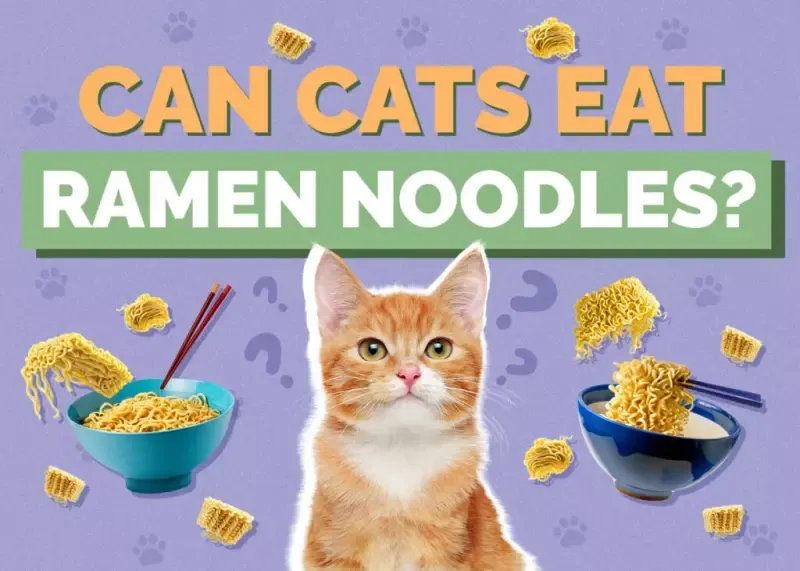Unveiling the Reality: Can Cats Safely Consume Ramen Noodles?
Ramen noodles, celebrated for their quick preparation and delightful flavors, have won the hearts of people worldwide. Comprising wheat-based noodles and an array of seasonings, they offer a convenient and flavorful meal for humans. However, a critical question lingers: Can our feline friends indulge in ramen noodles?
Can Cats Eat Ramen Noodles?
From a scientific perspective, cats are obligate carnivores, meaning their primary diet revolves around meat. On the contrary, ramen noodles are mainly composed of wheat-based noodles and an amalgam of seasonings. The verdict on whether cats can partake in ramen noodles is a definitive no. Here's why:
- Ingredients: Ramen noodles typically contain wheat flour, a complex carbohydrate that cats struggle to digest efficiently due to a lack of necessary enzymes.
- Seasonings: Many ramen noodle varieties come with seasonings high in sodium and may include ingredients like garlic and onions, which are toxic to cats.
To sum it up, feeding ramen noodles to your cat is discouraged due to their nutritional makeup and the potential presence of harmful elements.
Is Ramen Noodles Safe for Cats?
Cats may display curiosity towards ramen noodles because of their enticing aroma and taste. Nevertheless, this curiosity should not translate into incorporating ramen noodles into their diet.
While small quantities of plain, unseasoned ramen noodles may not pose immediate harm to your cat, they offer minimal nutritional value for feline well-being. Cats require a diet rich in high-quality animal protein, essential amino acids, and specific nutrients like taurine—all of which are lacking in ramen noodles.
Is Ramen Noodles Harmful to Cats?
Certain components commonly found in ramen noodles can be detrimental to cats:
- Sodium: Ramen noodles often contain high levels of sodium. Excessive consumption can lead to sodium ion poisoning in cats, resulting in symptoms like increased thirst, vomiting, diarrhea, and, in severe cases, seizures.
- Seasonings: The seasonings and flavorings that accompany ramen noodles may contain substances like garlic and onions, which are toxic to cats. These ingredients can lead to gastrointestinal distress, anemia, or organ damage.
Feeding your cat an excessive amount of ramen noodles, particularly those with seasoning, can have detrimental effects on their health.
Benefits of Ramen Noodles to Cats
Ramen noodles offer minimal benefits to cats due to their lack of essential nutrients. While they may contain some carbohydrates, these do not align with a cat's dietary requirements.
In contrast, high-quality cat food is carefully formulated to provide all the necessary nutrients for feline health, including essential proteins, vitamins, and minerals. Relying on ramen noodles as a source of sustenance for your cat is not recommended.
How Much Ramen Noodles Can Cats Eat?
The recommended amount of ramen noodles for cats is none at all. Cats should derive their nutrition from a well-balanced and complete cat food diet. Offering ramen noodles, even in moderation, can lead to an imbalanced diet lacking essential nutrients.
How to Feed Ramen Noodles to Cats
Feeding ramen noodles to your cat is not advisable. Instead, focus on providing your feline companion with high-quality cat food that caters to their nutritional requirements.
Alternatives and Supplements
Rather than considering ramen noodles for your cat, explore alternatives and supplements that can enhance their diet:
- Cat Grass: Cat grass can provide additional fiber and nutrients that may benefit your cat's digestion.
- Fish Oil Supplements: Omega-3 fatty acids from fish oil can support your cat's coat and skin health.
- Specialized Cat Foods: Consult with your veterinarian to find high-quality cat food brands offering specialized formulas to address your cat's specific dietary needs.
In summary, while ramen noodles may be a convenient and flavorful option for humans, they are not suitable for feline consumption. Cats have unique dietary needs that should be met through high-quality cat food to ensure their overall health and well-being.

